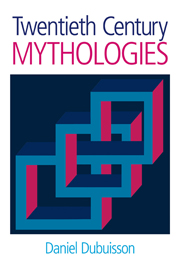Book contents
- Frontmatter
- Epigraph
- Contents
- Foreword by Professor Robert A. Segal
- Preface
- Abbreviations
- Introduction: History and comparative epistemology
- Part I Georges Dumézil, or Society
- Part II Claude Lévi-Strauss, or the Mind
- Part III Mircea Eliade, or the Sacred
- 12 Fascism and mysticism
- 13 Primitive ontology
- 14 The eternal return of anti-Semitism
- 15 The neo-paganism of homo religiosus
- 16 Metaphysics and politics: Eliade and Heidegger
- Addendum III Esotericism and fascism
- Addendum IV The reconstruction of prehistoric religions
- Addendum V The Eliadean conception of symbolism
- Addendum VI Forgetting the Shoah
- Conclusion: Modern theories of myth and the history of Western thought
- Bibliography
- Index
15 - The neo-paganism of homo religiosus
from Part III - Mircea Eliade, or the Sacred
- Frontmatter
- Epigraph
- Contents
- Foreword by Professor Robert A. Segal
- Preface
- Abbreviations
- Introduction: History and comparative epistemology
- Part I Georges Dumézil, or Society
- Part II Claude Lévi-Strauss, or the Mind
- Part III Mircea Eliade, or the Sacred
- 12 Fascism and mysticism
- 13 Primitive ontology
- 14 The eternal return of anti-Semitism
- 15 The neo-paganism of homo religiosus
- 16 Metaphysics and politics: Eliade and Heidegger
- Addendum III Esotericism and fascism
- Addendum IV The reconstruction of prehistoric religions
- Addendum V The Eliadean conception of symbolism
- Addendum VI Forgetting the Shoah
- Conclusion: Modern theories of myth and the history of Western thought
- Bibliography
- Index
Summary
To idealize “the religious respect for the earth and for life, the belief that the sacred reveals itself directly through the mystery of fecundity and cosmic renewal” (Mém1, 285), as Eliade proposed doing, represents at best a mystic, metaphysical reinterpretation of the naturalist and vitalist theses that flourished at the turn of the twentieth century around the work of Mannhardt and Frazer. In the same period the idea arose that by studying the cults of primitive peoples one would gain access to the elementary forms (Durkheim), the matrices of all religion: “…archaic and primitive [religions], in which there is a chance [for the historian of religions] of meeting certain religious institutions at a still elementary stage” (MA, 193).
Eliade associates this prejudice with another one that contradicted the optimistic evolutionism of nineteenth- and early-twentieth-century scholars, as they had almost always held the two conjointly. Far from conceiving each primitive fact as a sketch or a simplified, crude conception of what in time would become more complete, eventually producing evolved forms that we recognize today, Eliade stresses the origin and devalues the meaning we attribute to historic progress. When he remarks that “the myths of ‘primitives’ still reflect a primordial condition” (MR, 5), he means that these myths represent our most precious “ontic” documents because they reveal to us literally what happened at the origin; how the gods created the cosmos and breathed life into it; and how, in a word, archaic homo religiosus at the time coexisted with the most powerful manifestations of the Sacred.
- Type
- Chapter
- Information
- Twentieth Century Mythologies , pp. 221 - 232Publisher: Acumen PublishingPrint publication year: 2006



